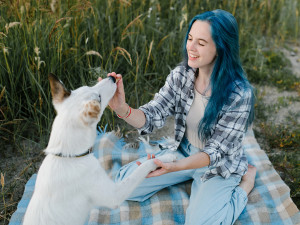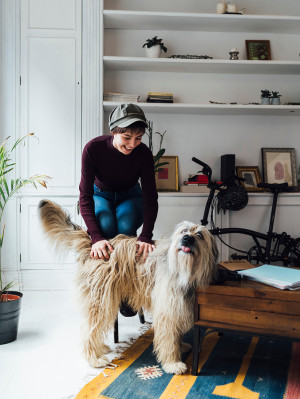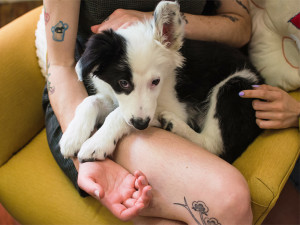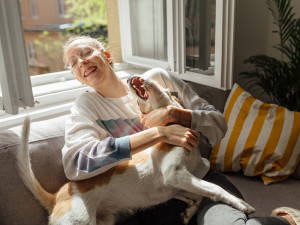The “Puppy Blues” Are a Struggle for About Half of New Dog Parents, Study Finds
If you’re feeling stressed or sad after bringing home a young pup, you’re not alone.

Share Article
Adopting a puppy is a big decision — and while people mostly talk about the countless positives of the experience, it’s not always a walk in the park. Like any life-changing event, bringing home a pup can come with some mixed emotions.
Don’t worry: If you’re feeling stressed or sad after adopting a new dog, you’re far from alone — and all that anxiety will pass. A new survey found that about half of all dog parents experience the “puppy blues,” and for the majority of them, the negative feelings went away in a short amount of time.
What are the puppy blues?
For many pet parents, it’s startling to feel some unhappy emotions kick in after the excitement of adopting a new dog. But raising a puppy can be hard work, and it’s normal for people to experience frustration, exhaustion, and insecurity when they take on the responsibility.
Those negative feelings are called the puppy blues. There are a myriad of causes — from losing sleep to skipping social events to hitting roadblocks while training, caring for a new dog can be disruptive. “Logically speaking, it should surprise nobody that the first few months after adopting a new puppy can be emotionally challenging, and yet it does seem to sneak up on so many of us,” behaviorist and trainer Dr. Karen B. London wrote for us.opens in new tab

The puppy blues are super common — and they usually don’t last.
In a new studyopens in new tab published in npj Mental Health Research, researchers surveyed 1572 dog parents about their experiences raising puppies. There were 224 breeds and breed variants represented, and pet parents ranged across a large variety of ages.
They found that 45 percent of respondents experienced “significant negative feelings during their dog’s puppyhood,” wrote lead author Aada Ståhl. For 20 percent of people, those feelings lasted for less than a month; 31 percent reported that the feelings lasted for one to five months; 30 percent reported that the feelings lasted from six months to one year; and 19 percent reported that the feelings lasted for over one year.
The researchers identified three factors that contributed to the pet parents’ negative feelings: frustration, anxiety, and weariness. “The anxiety factor primarily focuses on self-doubt and feelings of inadequacy as a dog owner, as well as concerns about the puppy’s well-being and development,” Ståhl wrote. “The frustration factor, on the other hand, measures the overall sense of dissatisfaction and emotional strain experienced due to the challenges and unexpected difficulties in caring for a puppy, including feelings of irritation, doubts about the bond with the puppy, perceiving tasks as demanding and questioning the decision to get a puppy.”
The weariness factor refers to sleep disturbances, exhaustion, and anxiety about the time required by the puppy.
You can deal with the puppy blues — here’s how.
The good news: There are ways to alleviate some of these negative feelings. One strategy is to focus on tangible ways you can address whatever puppy behavior is stressing you out.
“Start by coming up with one thing you can do to ease the situation by making it less overwhelming,” London recommended. “That might mean giving your pup additional exercise and play time so they rest more and sleep better. Another option is signing up for a puppy class or for private training sessions.”
Another important tool: You-time. As much as you can, don’t neglect yourself and your usual routine. “Make sure to go out with your friends, get outdoors for exercise and fun, spend time doing your favorite hobbies, or whatever else makes you happy and helps you to feel energized,” London wrote. “Whether it’s a friend, relative, neighbor or dog sitter, arrange for someone else to hang out with the puppy so you can have a break.”
Lastly, keep in mind that these feelings will most likely pass, and the joys of having your new BFF around will far outweigh the stress of the initial adjustment. Prioritize our mental health, and don’t be afraid to ask for help — whether that’s with pet care or your own emotional needs.
“If you continue to feel bad long after the burdens of early puppy parenting have eased, or you feel extreme despair, unshakeable hopelessness, or an extreme degree of any other negative emotion, consult with a mental health professional,” London wrote.
References:

Sio Hornbuckle
Sio Hornbuckle is the Assistant Editor at Kinship, where they frequently write for the site. As a writer, they specialize in pet news, animal science, and pop culture. They live in New York City with their cat, Toni Collette.
Related articles
![woman with new puppy]()
9 Unexpected To-Dos for New Pet Parents
Sound advice from seasoned dog and cat parents who have been there.
![Two hands holding a very young tan and white puppy up in front of a lake landscape]()
How to Socialize a Puppy
Everything you need to know to get your new addition off to a good start.
![Valentin Pujadas illustration]()
FYI, Pets Are Incredibly Good For Your Mental Health
Experts share the science-backed ways our pets offer us emotional support.
Do Anxious Dog Parents Raise More Anxious Dogs?
Which comes first: a nervous person or a nervous pup?
![Girl sitting on couch hugging her playful dog with the window open to outside]()
7 Myths About Rescue Animals—Debunked
For starters: No, they’re not all traumatized and yes, you can find a purebred puppy at a shelter.
![woman playing with her dog in the park]()
Why Your Dog Should Be Your Go-To Stress Buster
You need a break sometimes, and your dog is ready (and willing!) to take one with you.









